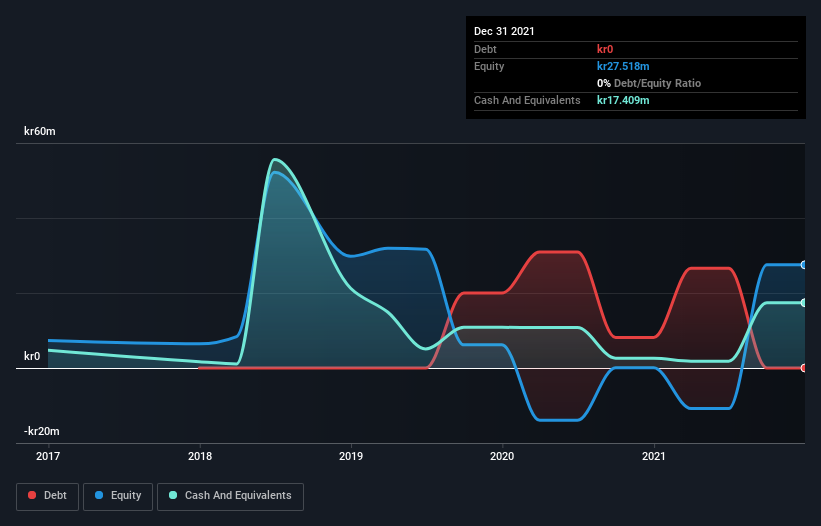Here's Why We're Watching Ranplan Group's (STO:RPLAN) Cash Burn Situation

Even when a business is losing money, it's possible for shareholders to make money if they buy a good business at the right price. For example, although Amazon.com made losses for many years after listing, if you had bought and held the shares since 1999, you would have made a fortune. But while history lauds those rare successes, those that fail are often forgotten; who remembers Pets.com?
Given this risk, we thought we'd take a look at whether Ranplan Group (STO:RPLAN) shareholders should be worried about its cash burn. For the purposes of this article, cash burn is the annual rate at which an unprofitable company spends cash to fund its growth; its negative free cash flow. The first step is to compare its cash burn with its cash reserves, to give us its 'cash runway'.
View our latest analysis for Ranplan Group
Does Ranplan Group Have A Long Cash Runway?
You can calculate a company's cash runway by dividing the amount of cash it has by the rate at which it is spending that cash. When Ranplan Group last reported its balance sheet in December 2021, it had zero debt and cash worth kr17m. In the last year, its cash burn was kr27m. So it had a cash runway of approximately 8 months from December 2021. That's quite a short cash runway, indicating the company must either reduce its annual cash burn or replenish its cash. The image below shows how its cash balance has been changing over the last few years.

How Is Ranplan Group's Cash Burn Changing Over Time?
Whilst it's great to see that Ranplan Group has already begun generating revenue from operations, last year it only produced kr15m, so we don't think it is generating significant revenue, at this point. As a result, we think it's a bit early to focus on the revenue growth, so we'll limit ourselves to looking at how the cash burn is changing over time. Over the last year its cash burn actually increased by 6.4%, which suggests that management are increasing investment in future growth, but not too quickly. That's not necessarily a bad thing, but investors should be mindful of the fact that will shorten the cash runway. In reality, this article only makes a short study of the company's growth data. You can take a look at how Ranplan Group is growing revenue over time by checking this visualization of past revenue growth.
How Easily Can Ranplan Group Raise Cash?
Since its cash burn is increasing (albeit only slightly), Ranplan Group shareholders should still be mindful of the possibility it will require more cash in the future. Issuing new shares, or taking on debt, are the most common ways for a listed company to raise more money for its business. Commonly, a business will sell new shares in itself to raise cash and drive growth. By looking at a company's cash burn relative to its market capitalisation, we gain insight on how much shareholders would be diluted if the company needed to raise enough cash to cover another year's cash burn.
Ranplan Group's cash burn of kr27m is about 13% of its kr199m market capitalisation. Given that situation, it's fair to say the company wouldn't have much trouble raising more cash for growth, but shareholders would be somewhat diluted.
Is Ranplan Group's Cash Burn A Worry?
On this analysis of Ranplan Group's cash burn, we think its cash burn relative to its market cap was reassuring, while its cash runway has us a bit worried. Summing up, we think the Ranplan Group's cash burn is a risk, based on the factors we mentioned in this article. Taking a deeper dive, we've spotted 6 warning signs for Ranplan Group you should be aware of, and 2 of them don't sit too well with us.
Of course Ranplan Group may not be the best stock to buy. So you may wish to see this free collection of companies boasting high return on equity, or this list of stocks that insiders are buying.
New: AI Stock Screener & Alerts
Our new AI Stock Screener scans the market every day to uncover opportunities.
• Dividend Powerhouses (3%+ Yield)
• Undervalued Small Caps with Insider Buying
• High growth Tech and AI Companies
Or build your own from over 50 metrics.
Have feedback on this article? Concerned about the content? Get in touch with us directly. Alternatively, email editorial-team (at) simplywallst.com.
This article by Simply Wall St is general in nature. We provide commentary based on historical data and analyst forecasts only using an unbiased methodology and our articles are not intended to be financial advice. It does not constitute a recommendation to buy or sell any stock, and does not take account of your objectives, or your financial situation. We aim to bring you long-term focused analysis driven by fundamental data. Note that our analysis may not factor in the latest price-sensitive company announcements or qualitative material. Simply Wall St has no position in any stocks mentioned.
About OM:RPLAN
Ranplan Group
A software company, develops, markets, licenses, and sells various software solutions in Asia, North America, Europe, the Middle East, and Africa.
Medium-low and overvalued.
Market Insights
Community Narratives



